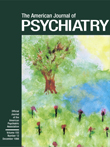In recent years there has been a resurgence of scholarly interest and research concerning the relationship between mental illness and artistic creativity. One aspect of this scholarship has focused on artists with psychosis (
1), among whom Adolf Wölfli is perhaps the best known and certainly one of the most highly regarded.
Wölfli’s talents and accomplishments as an artist were first recognized and encouraged by Walter Morgenthaler, his psychiatrist at the Waldau Mental Asylum near Bern, Switzerland, between 1907 and 1919. Wölfli had been hospitalized at Waldau in 1895, and he remained there until his death in 1930, at the age of 66. In 1921, Morgenthaler published his highly regarded monograph,
Madness and Art: The Life and Works of Adolf Wölfli (
2).
The book reviewed here, Adolf Wölfli: Draftsman, Writer, Poet, Composer, edited by Elka Spoerri, comprises a series of essays documenting and providing critical commentary on all aspects of Wölfli’s vast artistic output, which included drawings, prose, poetry, and musical compositions. In addition, the book contains a very brief biography of Adolf Wölfli and a “catalogue” of his existing works. As noted in the preface by Prof. Jean-Pierre Colombo, President of the Adolf Wölfli Foundation, the essays “investigate Wölfli’s artistic work not only from an art-historical point of view but also from the perspectives of psychology, psychiatry, literature, text analysis, and musicology.” In addition, Colombo notes that another aim of this volume is to “illustrate Wölfli’s pictorial work vividly and copiously...[with] 77 color plates and 111 black-and-white illustrations.”
The major essay in this book is by Elka Spoerri, who was curator of the Adolf Wölfli Foundation from 1975 to 1996. In this monographic essay, Spoerri provides a summary of Wölfli’s life and a chronological description of his massive artistic output. Concerning his narrative oeuvre, she writes that it was of “paramount importance to Wölfli” and “his life’s work.” Consisting of “prose texts, which are interwoven with poems, musical compositions, and illustrations,” Wölfli’s fantastic autobiographical narrative included “forty-five large volumes and sixteen school notebooks with a total of twenty-five thousand densely filled pages…[that] is a totally unified work.”
Wölfli divided this narrative into five somewhat overlapping chronological groupings: From the Cradle to the Grave, 1908–1916; Geographic and Algebraic Books, 1912–1916; Books With Songs and Dances, 1917–1922; Album Books With Dances and Marches, 1924–1928; and Funeral March, 1928–1930. In addition, Wölfli created a body of work that Morgenthaler called “bread art,” i.e., single-sheet drawings, largely produced from 1916 to 1930, which Wölfli made “for others in order to get colored pencils, paper, tobacco, etc.”
Other essays included in this volume are Harald Szeemann’s “No Catastrophe Without Idyll, No Idyll Without Catastrophe,” reprinted from a 1976 exhibition catalog; Louis A. Sass’s “Adolf Wölfli, Spatiality, and the Sublime”; Marie-Françoise Chanfrault-Duchet on “Wölfli and Autobiographical Writing”; Allen S. Weiss on “Music and Madness”; Max Wechsler on “Wölfli and Walser: Some Thoughts About Their Congruence in Spite of Their Disparity”; and Daniel Baumann on “The Reception of Adolf Wölfli’s Work, 1921–1996.” The brief section of diagrams of “Wölfli’s Vocabulary of Forms,” by Markus Rätz, is most helpful in interpreting the idiosyncratic iconography in Wölfli’s drawings.
Since many of the black-and-white reproductions are quite small, it is hard to see details in the drawings that are discussed in the text. Moreover, illustration numbers are often not cited in the text, forcing the reader to search by title for specific illustrations.
In summary, this book contains a rather diverse collection of scholarly essays that merit close reading. When it is time for a break, the reader can turn to the color illustrations of Wölfli’s drawings. They are magnificent.

